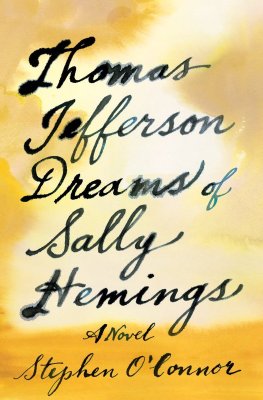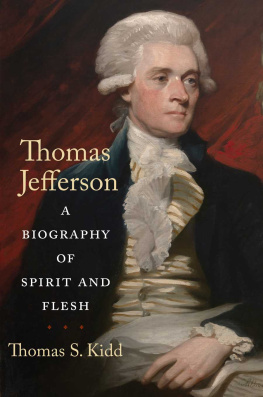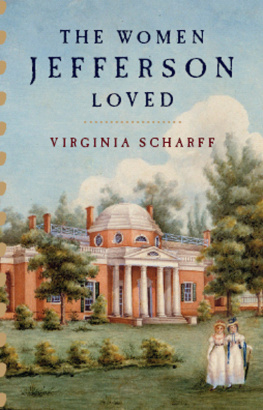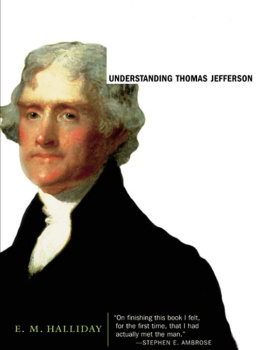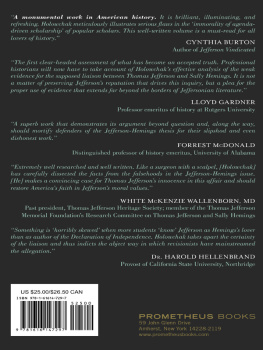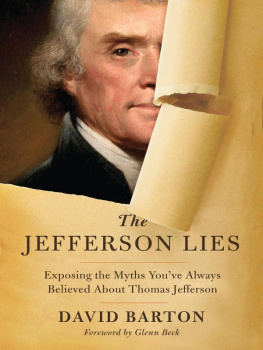Stephen O'Connor
Thomas Jefferson Dreams of Sally Hemings
To Evan and Brenda Turner, my other parents
What a stupendous, what an incomprehensible machine is man! who can endure toil, famine, stripes, imprisonment or death itself in vindication of his own liberty, and the next moment be deaf to all those motives whose power supported him thro his trial, and inflict on his fellow men a bondage, one hour of which is fraught with more misery than ages of that which he rose in rebellion to oppose.
Thomas Jefferson to Jean Nicolas Dmeunier, June 26, 1786
Is he willing to prevent evil, but not able? Then he is impotent. Is he able but not willing? Then he is malevolent. Is he both able and willing? Whence then the evil?
David Hume (paraphrasing Epicurus), Dialogues Concerning Natural Religion
So, even though we face the difficulties of today and tomorrow, I still have a dream. It is a dream deeply rooted in the American dream. I have a dream that one day this nation will rise up and live out the true meaning of its creed: We hold these truths to be self-evident, that all men are created equal.
Martin Luther King Jr., August 28, 1963
In some ways Thomas Jefferson finds death more appealing than life. Nothing he does matters anymore, and so he is able to lose himself more completely in the moment. Now he is lost in the emerald translucency of locust leaves in dawn light. Now in a cloud of indigo butterflies fluttering over meadow grass. And now his heart is broken by the contest between joy and despair in every note of birdsong. Birds have three springs inside their heads, and seven cogs, and are not actually capable of choice, and yet, all day, every day, they sing of joys inability to outlast despair. There is something in this that Thomas Jefferson finds unspeakably beautiful.
Thomas Jefferson is on his knees in a window seat, looking down a long reddish road shaded by two rows of poplar saplings. He is ten years old and holding a pocket watch to his ear. He hears a dog bark, the whispery commotion of wind in leaves, a crows caw but only silence from the watch. As he lowers it to take another look, he can hear and feel the tiny impacts of minute gears and screws tumbling through its complex interior. This watch used to belong to my father, Thomas Jeffersons own father told him only three days ago. He gave it to me so that, by marking time, I might learn not to waste it. I hope you will learn the same lesson.
During the first two days after receiving the watch, Thomas Jefferson enjoyed timing things: the length of his sleep eight hours and sixteen minutes; the time it took to walk from his house to the Rivanna River thirty-three minutes; the time between the bottom edge of the sun touching the western mountains and the top edge vanishing from sight three and a half minutes. Yesterday afternoon, however, he noticed along the rim of the watch a small groove, into which he inserted the tip of his penknife. With a quick twist, he popped off the watchs back and discovered an intricate assemblage of twitchily rotating brass wheels partially concealed by a pair of engraved nickel brackets shaped like the scapulae of a mouse. Curious to find the source of the watchs ticking, he used his penknife to unscrew first one of the nickel brackets and then the other, revealing the very heart of the watch: a tiny coiled spring that at the touch of his gaze snapped and sent two gear wheels flying into the air. There followed a moment of panicked thrashing, during which he not only failed to capture the flying wheels but scattered the watch parts he had already removed. After much crawling about on the dark rug, and then a good hour of sweaty, groan-punctuated labor, he was forced to admit that he could neither remember nor deduce where all the loose gears and brackets belonged, and he had three pieces (a rod, a sprocketless wheel and a J-shaped wafer of metal) that he had no idea what to do with at all.
Those three pieces lie on the window ledge beside his open penknife. He was thinking he would make one last attempt at repairing the watch before confessing his transgression to his father, but now, with a voiced sigh, he sweeps the tiny pieces off the ledge into his palm, then slips them into his waistcoat pocket, followed by the watch itself.
As he makes his way downstairs, he can see the look of disappointment on his fathers face, and he can hear his fathers reprimands: I didnt give you the watch, I entrusted it to you; You have betrayed your grandfathers memory; I would never have believed that you could be so imprudent.
Thomas Jefferson knocks on the door to his fathers study. Hearing no answer, he lifts the latch and pushes. The chair at the desk is empty. A window is open about an inch, and the breeze blowing through it flips up one corner of a piece of paper on the desktop again and again. Another piece of paper lies in the middle of the rug in front of the desk. The big chair by the hearth where his father is wont to read historical and scientific books is also empty.
Jillery is sitting motionless at the kitchen table with her forehead resting on the knuckles of her lifted and folded hands. She doesnt turn when Thomas Jefferson walks up behind her. He waits a long moment before he dares to speak, and when he asks where his father might be, she says, You best not be looking for him right now, Master Tom. She speaks so softly, and with such a weighty expression on her face, that it is a moment before Thomas Jefferson can fully take in what she has said.
But I need to talk to him, he says. It is important.
She looks at him for a long time with that same weighty expression, then only shrugs.
He walks out the kitchen door into the garden. That dog he heard when he was kneeling at the window is still barking. Its Captain, he realizes now, from the squeaky yelp in the middle of each bark. No doubt Captain has treed another squirrel. He is seventeen years old and much too slow to actually catch a squirrel, but that doesnt stop him from trying, or from spending an hour barking hopefully at the base of a tree. The barks seem to be coming from the mill, which is where Thomas Jefferson is headed. But there arent any trees near the mill.
The freshly turned soil in the kitchen garden is black, moist and redolent of what he always thinks of as the smell of earthworms. Someone has been cutting bean stakes on the stool by the toolshed. A small tepee of them leans against the weathered wall, and yellowish whittled slivers make a corona around the base of the stool. All at once Thomas Jefferson hears the low rasp of something sliding along the sheds inner wall, the clank of metal against metal and a soft grunt.
Jupiter? Thomas Jefferson stops in his tracks. Jupiter?
He opens the door and sees a Negro boy his own age, crouched at the back of the shed, the long handle of a shovel across his knees. What are you doing in here? Thomas Jefferson says.
Nothing. Jupiter pushes the shovel handle up toward the wall, but it swings right back down on top of him.
What do you mean, nothing?
Jupiter gives the handle another push, but it falls back down again. Were he only to stand, he could easily rest the shovel against the wall, but he remains crouching in the corner, the handle angled across his knees.
Just resting, he says softly. He doesnt meet Thomas Jeffersons eyes.
I saw three big trout by Castle Rock yesterday.
Jupiter looks up at Thomas Jefferson as if he doesnt recognize him.
I may go down there later, says Thomas Jefferson.
I dont know. Jupiters brow is convoluted and dark. I think maybe I cant.
Thomas Jefferson sighs. Well, maybe I cant either. He takes the watch out of his pocket. You know what I did? He hands the watch to Jupiter. Listen. Jupiter takes the watch and puts it to his ear, but he doesnt say anything.

